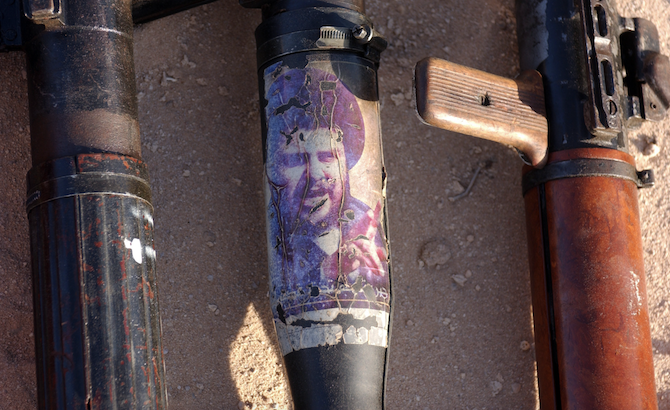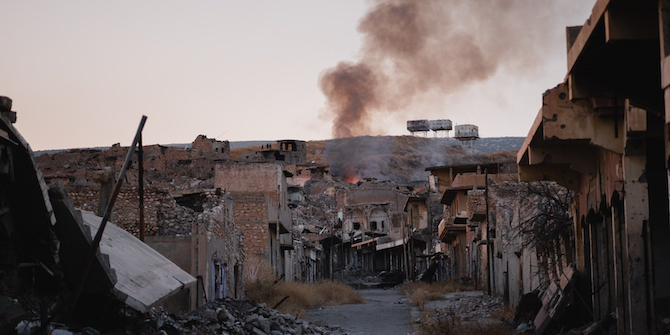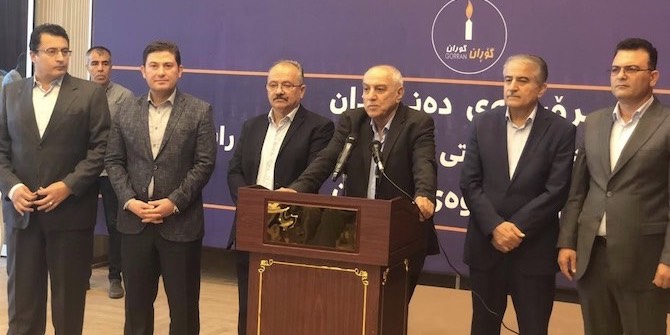by Federico Manfredi Firmian

Militias linked to Iran long posed a daunting challenge to the stability of Iraq. Now, at last, the political tide is turning against them. Parties representing Iran-backed militias performed poorly in last October’s parliamentary elections and their subsequent efforts to discredit the legitimacy of the electoral process proved ineffective.
Against this backdrop, the failed assassination attempt against Prime Minister Mustafa al-Kadhimi further sullied the reputation of militias and their leaders. Even violent protests and ongoing sit-ins outside the Green Zone, which the militias staged to put pressure on Iraq’s government following their weak electoral showing, have so far failed to translate into concrete political concessions.
For Iraq and its people, these developments may offer a momentous opportunity to curb militia power and thus safeguard a series of overall positive trends, which include enhanced security, better governance and deeper democratisation.
Until not long ago, militias such as Badr, Asa’ib Ahl al-Haq, Kata’ib Hezbollah, and Harakat Hezbollah al-Nujaba appeared untouchable. The rise of the Islamic State and the establishment of the Popular Mobilisation Forces in 2014 provided pro-Iran militias with state funding and elevated them to the status of national stalwarts, despite evidence that they received funds, arms, and training from Iran’s Islamic Revolutionary Guards Corps (IRGC). Their numbers thus swelled, from a few thousand members in 2010 to tens of thousands of battle-hardened fighters.
For years, Iran-backed militias silenced critics and opponents through violence, earning a reputation for egregious human rights abuses and political assassinations, in a context marked by the weakness of the Iraqi state and near-total impunity.
They likewise staged numerous attacks against US military and diplomatic targets in Iraq, as well as against Saudi oil installations. More broadly, they provided material support to the IRGC, as part of Iran’s aggressive foreign policy in Iraq and Syria, with destabilising effects across the region.
To cement their powerbases, the militias also established no-go zones to run training camps and secret prisons, as in Jurf al-Sakr and other rural areas around Baghdad. All of these actions were in flagrant violation of Iraq’s constitution, according to which the ‘formation of military militias outside the framework of the armed forces is prohibited.’ Yet, until 2019, nobody dared challenge Iran’s proxies.
The emergence of the Tishreen (October) movement in 2019, however, marked a major turning point. Massive popular protests coalesced in Baghdad’s Tahrir Square and denounced the corruption of entrenched political elites. The security forces responded with shocking levels of violence. Mahmoud Hussein, a young Iraqi activist who partook in the protests, described what he witnessed in Tahrir Square as ‘a war, in which one side was doing the shooting, and the other carried Iraqi flags and sang national songs.’ Hussein blamed the violence against demonstrators squarely on militia members serving in Iraq’s security forces. In his words, Tishreen was ‘an existential struggle – the people versus a regime backed by militias.’
As protests spread to central and southern Iraq, public opinion turned decidedly against the militias and their allies in government. Prime Minister Adel Abdel Mahdi, whose own party, the Islamic Supreme Council of Iraq, long maintained ties to both the Badr militia and the Iranian government, was forced to resign, in the face of mounting popular unrest and after a timely nudge from Grand Ayatollah Ali Sistani.
Months of political wrangling followed. But the appointment of Kadhimi as prime minister in May 2020 constituted another turning point. As an independent, Kadhimi managed to eschew party agendas and patronage networks.
He also established a new anti-corruption committee, leading to the arrest of several senior Iraqi officials in September and October 2020; and whereas Kadhimi lacked the power to pursue corruption cases implicating militias and well-known politicians, his actions represented nonetheless a first step in the right direction.
Meanwhile, the Tishreen protesters, displaced from public squares of Iraq by the onset of the Covid pandemic, braced for the October 2021 elections. Mahmoud Hussein joined a new political party but was soon forced to move to Iraq’s Kurdish region with his wife, having received multiple threats from known militia members. Like many Tishreen activists, Hussein ultimately decided to boycott the election.
Others, however, braved the militias. Sajid Salim, a lawyer from the Wasat governorate, east of Baghdad, ran as an independent, and won. ‘I campaigned on one issue only: I am against militias,’ he said. ‘The people are fed up with the militias. Enough is enough.’ Salim received multiple threats but carried on his political work. He is one of about 40 newly elected independent members of the Council of Representatives, the Iraqi parliament. Collectively, independents won a staggering 1.7 million votes, more than twice as many as the Sadrist bloc.
Sarwa Abdulwahid won a seat on behalf of the New Generation Movement, a relatively new Kurdish party challenging the power duopoly and corruption long prevalent in the Kurdish region. Abdulwahid said she hopes to establish an alliance with other reformists, including independents and new parties born out of popular challenges to the status quo, like Emtidad and Isharaket Qanun.
‘The times are ripe for change,’ she said. ‘Independents and reformist parties can uphold rights and freedoms, including for women and minorities. They can also participate in lawmaking efforts to curtail arms and punish militia members guilty of crimes,’ she said.
To be clear, the election was not a game changer. Parties linked to militias lost seats in large part due to their own failure to understand the new electoral system, which involved majoritarian first-past-the-post constituencies. The Sadrist bloc, on the other hand, obtained more seats than any other political formation, thanks to a well-planned electoral strategy.
Seasoned politicians like Nouri Al-Maliki also did reasonably well, and so did leading Sunni and Kurdish parties. It is also worth pointing out that as many as half of the independents may be ready to join pro-establishment parties and coalitions, as part of pre- or post-election deals.
But militia influence is dwindling and could fall further. Adel Alami, an independent legal expert and the former head of Iraq’s electoral commission, said that if Muqtada al-Sadr manages to form a government excluding the Iran-linked parties, his coalition could potentially pursue policies that lead militia members to join the armed forces or otherwise demobilise. ‘If provided with decent salaries, the members of the security forces would be loyal to the Iraqi state, rather than to militias,’ he said.
The government of Iraq could also leverage US support to obtain information that could lead to the arrest and trial of criminal militia members, in accordance with Iraqi laws. The United States, moreover, could sanction mid- and high-level militia commanders, as well as financial institutions and businesses connected to militias.
The militias will not go down easily. To be sure, they have recently renewed threats to attack the US military in Iraq. The Biden administration, however, ought to stand firm in the face of militia intimidation, and continue to exercise the US right to self-defence, selectively targeting offending militias so as to deter aggression.
As for Sadr, it is up for him to prove himself worthy of redemption. His pledges to dismantle sectarian quotas for political office (the muhahasa system) and to push back against Iran-backed militias are noteworthy and could contribute to advance much-needed reforms.
But over the years Sadr was also guilty of directly or indirectly contributing to government inefficiency and militia violence against protestors and other critical voices. That is why when he coined the slogan ‘complete removal’ (shala qala), in reference to the government, Tishreen protesters responded with chants of ‘complete removal, and the one who said with them’ (shala qala welli qalha wayahom).
Still, Sadr remains to this date the only Iraqi leader capable of mobilising his constituencies to prevent Iran’s militia proxies from carrying out further wrongdoings. If he wants to position himself as a genuine nationalist with the best interest of Iraq at heart, he should act on his electoral pledges and also offer protection to activists and other public figures vulnerable to militia violence. If he choses not to do so, however, he will reveal himself to be just another politician with his own private militia, and in this case the Iraqi people will continue to chant ‘shala qala, welli qalha wayahom.’






